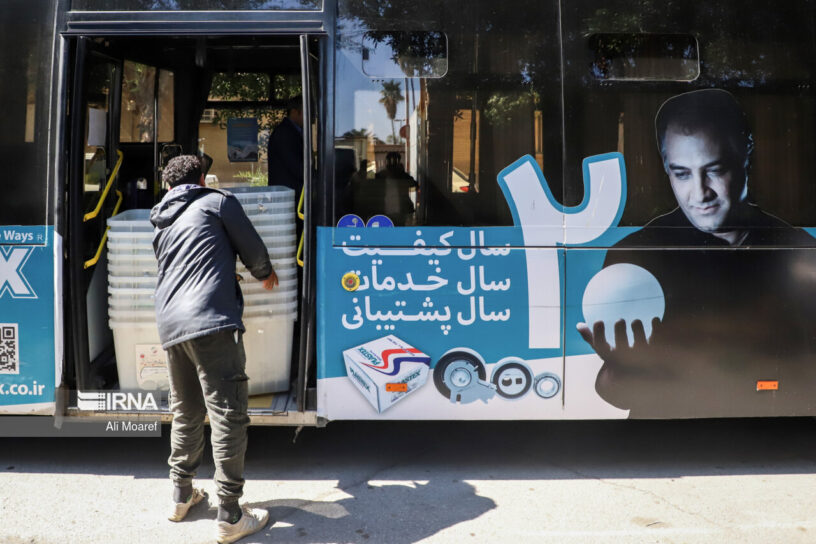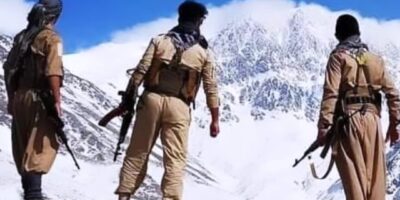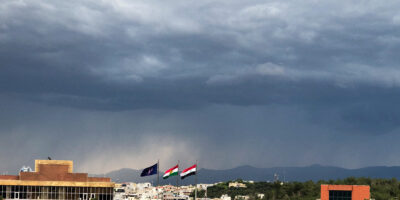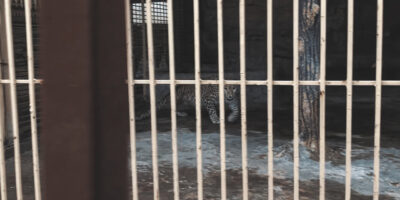With ordinary people struggling to survive in an economy that is in tatters, loved ones still behind bars after the September 2022 crackdown against protesters that saw hundreds killed and tens of thousands incarcerated, and authorities who appear more concerned with events in Gaza and Yemen than the interests of their own people, many in Iran are questioning whether there is any sense in voting. A large boycott is expected in Friday’s parliamentary and Assembly of Experts elections.
“In the land where there is no freedom, if voting made any difference, they would not let us vote,” said Mozghan Eftekhari, mother of Zhina (Mahsa) Amini whose death in September 2022 by the morality police in Tehran captured the imagination of people across the country, from all ethnic and religious backgrounds, driving them into the streets to protest and presenting the greatest existential threat the Islamic Republic has faced since 1979.
In Kurdish areas, opposition parties, activists and guilds have called on people directly or indirectly to refrain from going to the polls.
“What is left for us? We have no dignity, why should we vote?” said a 35-year-old man from Mariwan city in the Kurdish area of western Iran.
“I am not going to vote, nor is anyone in my entire family except one single person because he has a position within the system,” said a mother of three from Kermanshah province. “We have lost everything. We can’t even afford basic commodities because of the cost of living.”
Years of United States sanctions have decimated Iran’s economy, but the main nemesis is the mismanagement by the supreme leader and his lieutenants. The government has tried to paint a picture of strong manufacturing and trade sectors, but poverty and unemployment rates are skyrocketing. In the past, hardliners would blame reformists for the dire economic situation. However, since the last legislative election in 2020, the executive, the judiciary and the legislature have all been held by hardliners and the average citizen in the country is worse off.
This election is an important test for the supreme leader to show the world that he and his regime still enjoy support at home while it is under increasing pressure from the international community for its destabilising role in the events in Gaza on October 7 and the wider tensions that have ensued in the region.
“Those who dismiss voting or… encourage others not to vote, they should consider carefully. There is no benefit in not voting. You say voting could be useless, but it could also be useful too,” Supreme Leader Ali Khamenei said recently during a meeting. “Not going to the polls will not resolve any problems facing the country.”
Hossein Salami, head of the Islamic Revolutionary Guard Corps (IRGC), went as far as claiming that every vote is like “a missile targeting the heart of the enemies.”
However, even within the clerical establishment, some are questioning the wisdom of voting in a system that is rigged and have said that Khamenei is the root of the problem.
A Shia cleric released a video recently slamming Khamenei for focusing on Gaza and Lebanon while forgetting about the plight of ordinary Iranians.
“Mr Khamenei… the people are questioning your sincerity when you say we are present in Palestine to fight oppression … because they say if your concern is about oppression, what about the oppression inside [the country],” Mohammad Taghi Akbarnejad said in a video message. “I swear it is not the critics that weaken the state, but the wrong decisions made by you and your subordinates that make people hopeless. In this situation how do you expect people to go to the polls?”
He was promptly arrested by IRGC intelligence.
The regime is especially worried about the Kurdish areas and how they could influence the rest of the country thanks to the highly organised civil society organisations who function despite repeated arrests. A recent trove of documents from the Iranian judiciary hacked by an activist group showed that the regime was highly concerned about the unrest in the Kurdish areas following the killing of Zhina Amini by the morality police in September 2022.
A year and a half later, the crackdown is impacting the election.
“During this time of election campaigning, in particular in Mahabad… because of the heavy-handedness of the crackdown, even the candidates are embarrassed and avoid campaigning too much,” said Saman, 34, an activist in Mahabad who was detained during the protest.
He believes that the crackdown, during which some of his friends were killed, caused such a deep rift between the public and the authorities that the people are not prepared under any circumstances to give the regime more legitimacy.
“The atmosphere of the election is very passive and inactive and based on this, the voter turn will be the lowest,” Saman warned.




